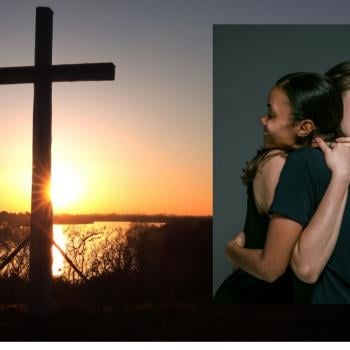The state of New York has recently recognized the legality of same-sex marriage, which has inevitably upset many conservative religious leaders in mainstream monotheistic religions and denominations. While I can only applaud any legal measures that make queer equality more viable and actual in the world, I also have to raise a point that many queer anti-assimilationist activists have been advocating for decades.
Assimilationist queer people have always maintained that they are just like straight people in every way other than "who we love," "who we kiss," or "what goes on in our bedrooms." And, in phrasing it in this way, and setting up the comparison of these different phrases, we see the difficulty. What bothers most homophobes about homoeroticism is not that queer people love other queer people. Indeed, the most ardent followers of Jesus today often have bumper stickers that say "Real Men Love Jesus" and other such statements that make it rather necessary to love all people regardless of gender or sexual orientation. (Whether or not they actually do that is another matter, of course!) The problem, in their mind, is with men having sex with men and women having sex with women.
But the two most-referenced biblical prohibitions, Paul's epistle to the Romans and the Holiness Code in Leviticus, do not outlaw men loving one another or women loving one another. Instead, they demonize sexual acts between people of the same biological sex.
I am reminded of the death by homophobic violence of Matthew Shepard back in 1998. One year after his death, a candlelight ceremony of remembrance was held for him at the Jesuit university I attended. The university chaplain spoke on the occasion, as did a few other people, and all of them wanted to highlight how Matthew was human, and was possessed of the inherent human dignity due to every person; but none of them wanted to deal with the fact that he was not killed because he was human just like everyone else. He was killed because he was gay.
I made it a point to recognize this, and to read a poem that had been published in an anthology in Matthew's honor which pointed out that his status as an out gay man prompted the horrific actions against him that lead to his death. Though I was not silenced for doing so, the event ended very rapidly after I spoke. People were not encouraged to stick around or discuss further afterwards.
And yet, this lack of acknowledgment of sex and sexuality can even exist among queer people. When I lived in Ireland, I met a number of younger queer people who were very much for all of the fashion-forward, stylish, scene-queen aspects of gay life, but who didn't seem very interested in having relationships, and also weren't interested in the "ickiness" of sex.
Part of me certainly does acknowledge and affirm that queer people are much like everyone else, and that everyone shares a common humanity that has similar needs on both physical and social levels, including needs for things like love and social acceptance. But another part of me—granted, the more radical and revolutionary part, but it deserves its say as well!—says that sex cannot be minimized or made into something less in all of this, since it is the thing for which we who are queer have been persecuted and killed across two millennia, and which is still killing people today (like Freddy Roberto Canul-Arguello in the last week). It is the thing that is causing teenagers to commit suicide because of the bullying and harassment they face, even though most of those teenagers have probably never had the chance to actually fall in love or be sexual.
Western erotophobia is certainly something that makes life difficult for everyone in the Western world. The assumptions that many modern Pagans and polytheists have—which is consonant with the views of many ancient societies and many modern non-Western cultures, which suggest that the body is beautiful and a joyous reality, that physical pleasure is a desirable end unto itself, that nudity and sexuality are not things to be ashamed of—is still not something that gets much attention.
I am not a supporter of the notion that sex is "just natural" or that sex cannot or should not be intellectualized. Indeed, the most fulfilling and satisfying sex I've ever had has not been purely physical. It has been the sex I've had which takes myself and all those participating in it as beings who are bodies, souls, emotions, and minds all working together in concert.
Many Pagans and adherents of other non-monotheist religions might describe such phenomena as "sacred sex." Yet, that very terminology (as Loraine Hutchins pointed out in Erotic Rites) is a problem. For Western people in particular, the fact that we must distinguish between "sacred sex" and "just regular sex" demonstrates just how flawed our notions of sexuality are. That there can be a difference between "sacred sex" (which is usually also thought of as implicitly better and more desirable and preferable) and "just regular sex" shows that sexuality, bodies, and erotic activities in general are treated not as wonderful and valuable realities in themselves, but as somehow "lesser" things in need of spiritualization or sacralization. If anything, then, Pagans who believe that sexuality is a sacred thing (like all other material and experiential aspects of the universe) should be the last people who have to use terminology like "sacred sex" to make their point-"just sex" should be good enough!





